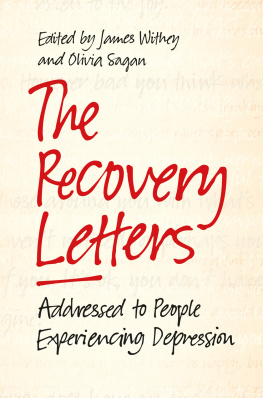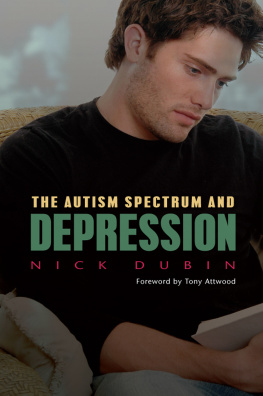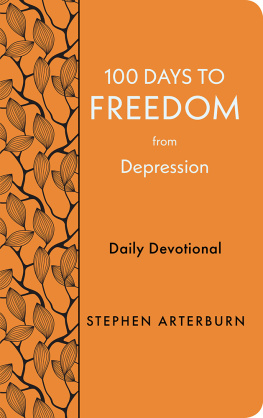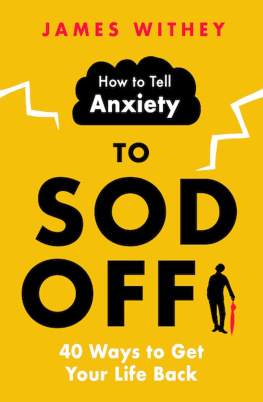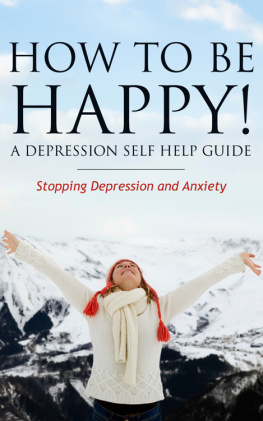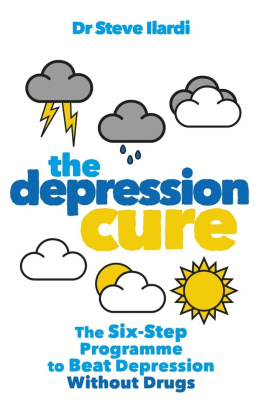
The Recovery
Lett ers
Addressed to People Experiencing Depression
Edited by James Withey and Olivia Sagan
Afterword by G. Thomas Couser

Jessica Kingsley Publishers
London and Philadelphia
CONTENTS
INTRODUCTION
WHY I STARTED THE
RECOVERY LETTERS
James Withey
Ive always loved letters; writing them and receiving them. As a child I would write to pen friends from around the world. I adored the physical act of opening up the letter, smelling the paper and imagining the sender with their pen and their thoughts in a different part of the world.
The best letters touch your soul. They reach out to you; they take hold of the part of you that feels alone and make you cry out, Me too! I thought it was just me, but you understand this as well. I hope thats what this collection of letters will do: connect to the part of you that feels you are the only one suffering from depression.
Letters, in whatever format they come in, are something to treasure, to re-read and keep. There is nothing more personal; the person has sat down and thought about you and only you, and now here you are, reading that they care.
A few years ago I was sat on my bed, in my room, in a psychiatric hospital. The bed was bolted to the floor, the window only opened two inches and it looked like the rubbish bin had been set on fire at some point. Every so often someone would come along, look through the glass in the door, see that I was alive and go away again.
At 3 oclock in the afternoon the sun would start to project the shadows of the tree across the wall in a ridiculously incongruous display. I looked at the beauty and it barely touched me. I kept thinking, How did I end up here? How did this happen? How did depression do this to me? How did my belt get taken away from me? How did I end up promising never to have a plastic bag in the room? Again, again and again, How did I end up here? The previous year, I was working as a staff trainer in a large charity and teaching suicide prevention; now, Im on 15-minute suicide watch.
What I didnt know in hospital was that I would start developing the idea for The Recovery Letters project, which has changed my life and changed other peoples too. A project so simple and with hope at its heart.
During the severest part of my depression all I could think about was suicide. I would wake up crying at 4.30am and I couldnt get back to sleep. On the train home from work I looked out of the window and made plans; Thursday, yes Thursday I would kill myself, its going to be Thursday. I would walk in front of a train and the pain would be gone. Thats all that mattered, getting rid of the pain.
If I had taken a bath by 4pm this was a good day. If I had eaten something this would feel like an unwanted achievement. I would go to the supermarket with a list of things to buy and stand in front of the aisles and think, How did I used to do this? What sort of tuna should I buy? The cheap one as I had little money? The one with spring water as I had been told brine contained mercury? The more expensive one where I might get more fish for my money? A multi-pack on offer? Did the one with the olive oil preserve the tuna better? It was impossible. One decision led to another, more questioning, more agony. More than once I walked out of the supermarket with nothing. The music was too loud, people seemed to be running down the aisles towards me, there were screaming babies and harsh tannoy announcements. It was hell in my hell.
I couldnt concentrate, I couldnt watch television, I paced around our flat and resented every sunny day, every person who tried to smile at me at the post office, but most of all I resented myself. This was all my fault. When I told people I was suffering with depression they were shocked. I had been the person who always listened to their problems and here I was, incapable of looking after myself.
Depression is about loss and there were many losses in my life during this time; relationships with friends were permanently altered, I couldnt work, I couldnt concentrate, I couldnt exercise, I didnt want to eat, I couldnt sleep, I lost all hope and, most significantly for me, I couldnt read.
Reading novels was my joy. I joined book groups, read a few novels a month, spent my time in old book shops, read online book reviews, scored and recorded my favourite books in a special journal, and lunch times were spent reading my book. Now, I couldnt read a sentence. Nothing; it was extraordinary in its totality. People would recommend tombstone-like books on depression and cognitive behavioural therapy (CBT) and they sat on the coffee table staring at me. I stared back, bemused. How did I used to do this? I used to just pick up a book and read the words, and now, nothing. Nothing. Just nothing.
One of the many cruelties of depression is that it takes away your coping mechanisms just when you need them and then convinces you they will never come back and its all your fault anyway. At your lowest point, when you need all your resources, depression takes them away.
I never thought I would get any better, never, ever, ever. It may happen to other people I said, but not for me. If I was ever convinced of anything in my life, it was that my depression would not improve. I would have placed significant bets on this had the local bookmaker accepted my odds; I would have been immensely rich and permanently depressed. I was wrong it did get better and now I do my best not to listen too much when depression starts to tell me similar lies; it doesnt always work but I try and thats all we can do, try and not listen to the lies.
Depression is a life-threatening, sometimes life-taking illness that takes huge guts to live with. The level of emotional pain is so huge that suicide can seem like the only option. Its also a devious cuckoo taking over your life, spitting and berating you with lies, hate and blame. Its hideous. It makes you believe the temporary is permanent and that you can never recover. The biggest mental health stigma is our own; and its fuel is depression.
When I was first unwell only one mental health worker ever told me I could recover from depression; they were a student with the crisis team who would visit me every day to see if I was alive. As they were leaving they turned in the doorway and said, James, it is possible to recover from depression. It was possible to recover from depression? Really? But the problem was, depression was telling me the opposite and in the loudest voice it had. I thought it was impossible, I would never get better, it was hopeless, living was pointless, the pain was too much and that it was more powerful than everything, just give up. But that day there was a tiny chink of hope and I realised that I needed to hear more about the possibilities of recovery if I was ever going to get any better.
I went to stay at Maytree Respite Centre in London (a residential service for people actively suicidal) and more hope was let in. I was able to speak freely about wanting to die; they listened, they understood, they saw the pain and saw me in the middle of the pain. They didnt panic and want to rescue me; they sat with me, literally and metaphorically. I feel destroyed, I said. The very essence of me has been annihilated, how can I continue when there is nothing left of me?
I dont see that said the worker, I see a man who has been crushed but not annihilated.
And then something inside me changed, some small light came on, it was flickering and fragile but definitely there. Maybe there was something of me left?
Alongside my own recovery the idea of The Recovery Letters started to gather momentum. What if people who were recovering from depression wrote to those that were currently suffering? What if people could read that recovery was possible? What if these letters could reach out to the small part of them that wanted to believe in recovery? What if they acted as small shots of hope? What if they helped people see that they werent alone?
Next page
